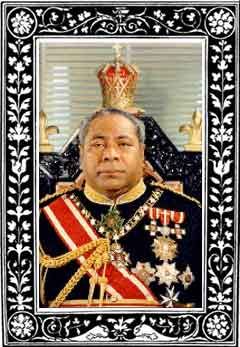September 11, 2006
R.I.P. King Tupou IV, Tongan language reformer
 Today's
New York Times carries an obituary
for the King of Tonga, Tāufaʻāhau Tupou IV, who died at the age of 88
after serving as his nation's powerful leader (and heir to the last
remaining
Polynesian monarchy) for 41 years. A good deal of the obituary focuses
on
the king's weight fluctuations — he tipped the scales at 460 pounds
before losing almost 200 pounds — but it also includes this
biographical nugget:
Today's
New York Times carries an obituary
for the King of Tonga, Tāufaʻāhau Tupou IV, who died at the age of 88
after serving as his nation's powerful leader (and heir to the last
remaining
Polynesian monarchy) for 41 years. A good deal of the obituary focuses
on
the king's weight fluctuations — he tipped the scales at 460 pounds
before losing almost 200 pounds — but it also includes this
biographical nugget:
As king, he commissioned the first dictionary and grammar of Tongan, a Polynesian language, while promoting changes in written Tongan, notably to have the letter "b" replaced with "p" and the symbol "g" with "ng."
This isn't entirely accurate. First of all, the reform of Tongan spelling occurred long before Tupou became king, though he was indeed instrumental in making the changes. In 1943, when the future king was known as Crown Prince Tupoutoʻa, his mother Queen Sālote appointed him Minister of Education. With the Tongan Privy Council he approved a number of changes to reform the old orthography instituted by Wesleyan Methodist missionaries. The Tongan voiceless labial stop, previously written as b, was changed to p. (Since Tongan /p/ is unaspirated, Anglophones often perceive it as a voiced stop /b/ and hence write it that way. The same is roughly true for Korean, though that language has both aspirated and unaspirated voiceless stops in its phonemic repertoire.)
The other change noted by the Times is the use of ng to represent the velar nasal /ŋ/. The Wesleyan missionaries were apparently not big fans of digraphs, so they had simply used the letter g for this phoneme. The nearby Polynesian languages Fijian and Samoan still stand by g for /ŋ/ — which explains why, for instance, the Samoan town of Pago Pago is actually pronounced /ˈpɑŋo ˈpɑŋo/. Various other tweaks were made by the Privy Council, such as the standardized representation of the glottal stop (fakauʻa) with a reversed apostrophe, much like the Hawaiʻian ʻokina.
As for the dictionary and grammar mentioned in the obituary, that presumably refers to Clark Maxwell Churchward's Tongan Grammar (1953) and Tongan Dictionary (1959), both of which used the reformed orthography. Again, the man who would be Tupou IV was not yet king when those works were written. During that time he served as the nation's prime minister, and would remain in that position until Queen Sālote died in 1965. I'm not aware of any major linguistic initatives, be they orthographic, grammatical, or lexicographic, carried out by Tupou while reigning as king. Perhaps he was too busy gaining and losing all that weight.
(I'm no Tonganist, so much of the above is based on Elizabeth Wood-Ellen's Queen Sālote of Tonga: The Story of an Era, 1900-1965.)
Posted by Benjamin Zimmer at September 11, 2006 01:35 AM